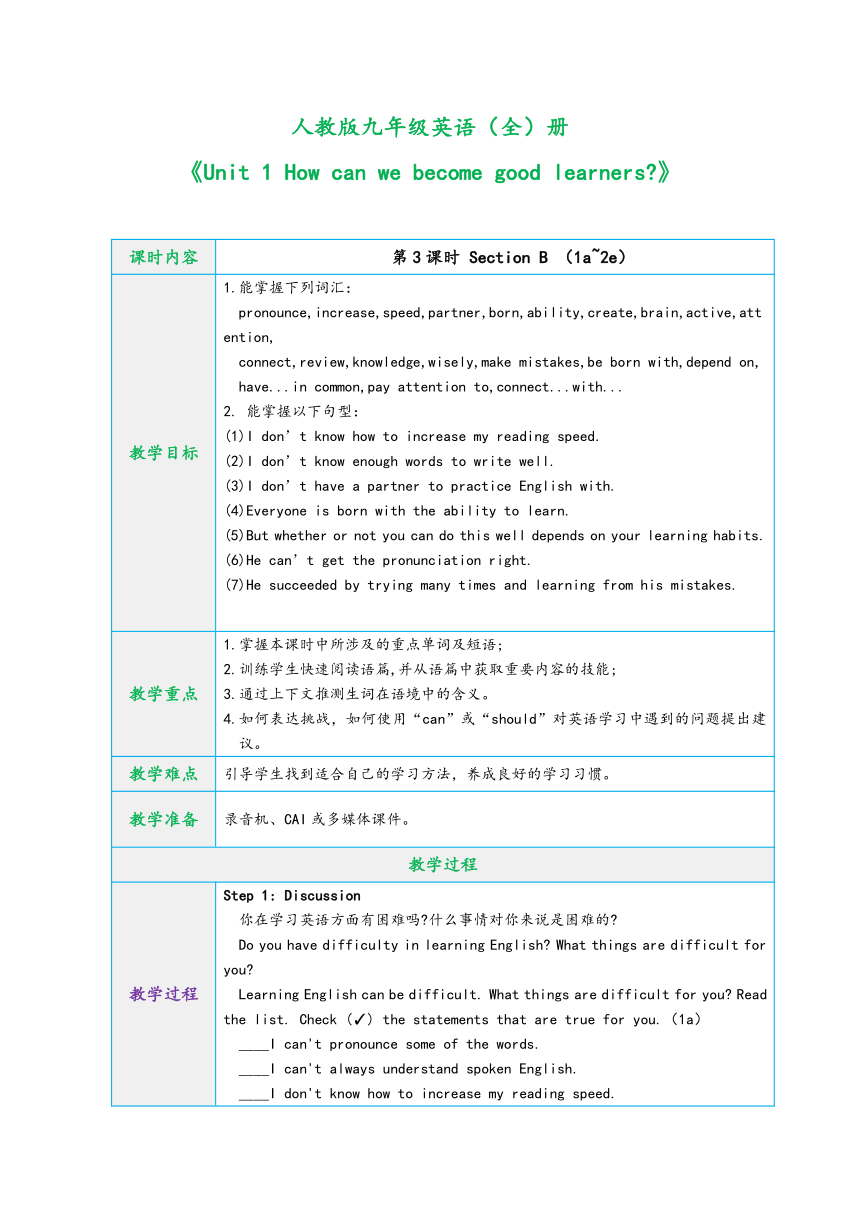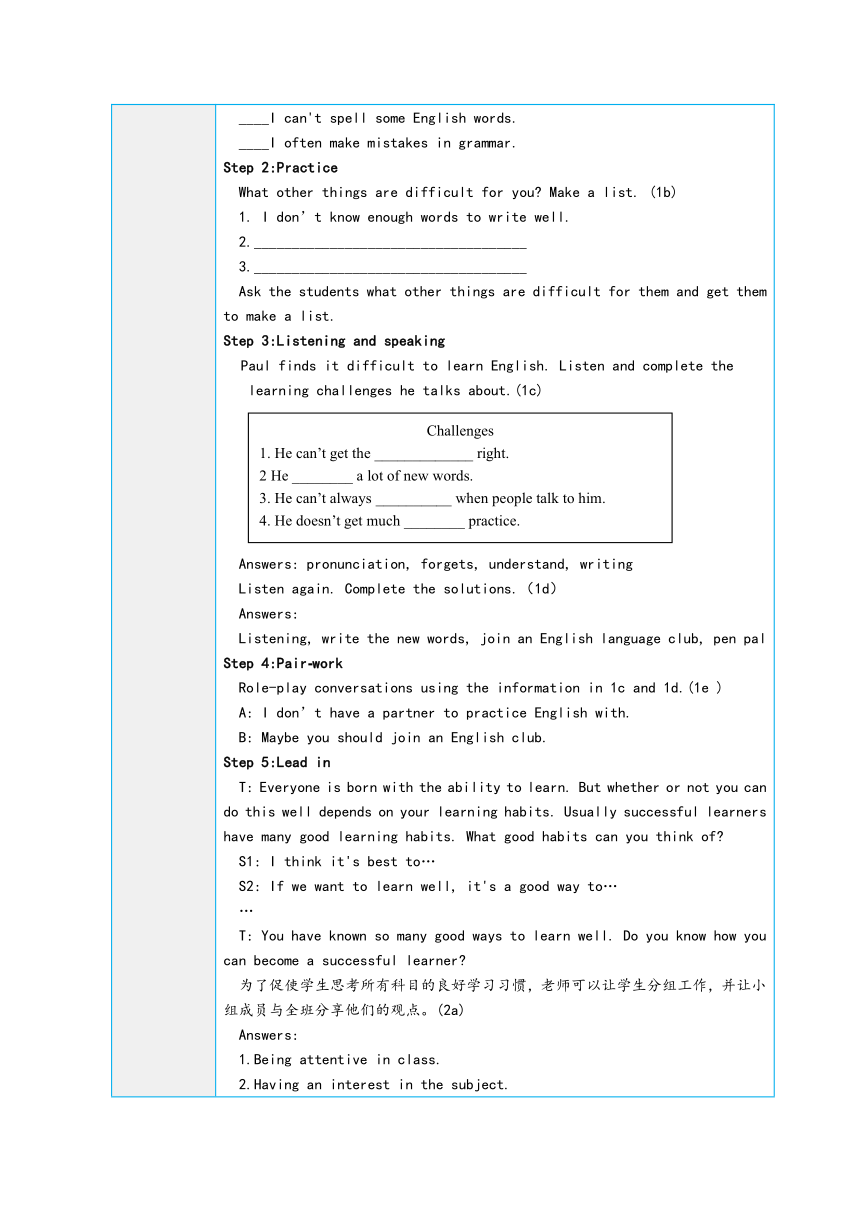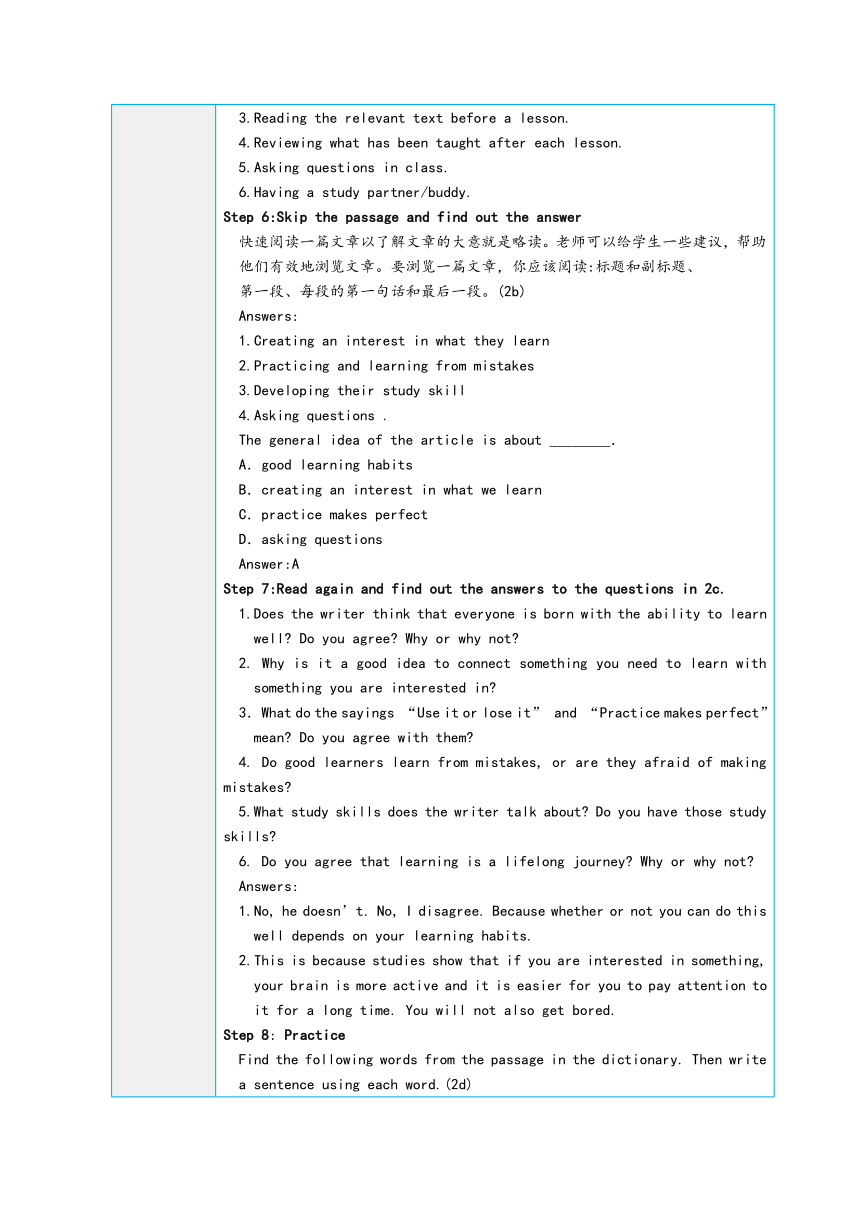Unit 1 How can we become good learners?第3课时 Section B (1a~2e)(教学设计)(表格式)
文档属性
| 名称 | Unit 1 How can we become good learners?第3课时 Section B (1a~2e)(教学设计)(表格式) |

|
|
| 格式 | docx | ||
| 文件大小 | 27.4KB | ||
| 资源类型 | 教案 | ||
| 版本资源 | 人教新目标(Go for it)版 | ||
| 科目 | 英语 | ||
| 更新时间 | 2024-05-30 00:00:00 | ||
图片预览



文档简介
人教版九年级英语(全)册
《Unit 1 How can we become good learners 》
课时内容 第3课时 Section B (1a~2e)
教学目标 1.能掌握下列词汇: pronounce,increase,speed,partner,born,ability,create,brain,active,attention, connect,review,knowledge,wisely,make mistakes,be born with,depend on, have...in common,pay attention to,connect...with... 2. 能掌握以下句型: (1)I don’t know how to increase my reading speed. (2)I don’t know enough words to write well. (3)I don’t have a partner to practice English with. (4)Everyone is born with the ability to learn. (5)But whether or not you can do this well depends on your learning habits. (6)He can’t get the pronunciation right. (7)He succeeded by trying many times and learning from his mistakes.
教学重点 1.掌握本课时中所涉及的重点单词及短语; 2.训练学生快速阅读语篇,并从语篇中获取重要内容的技能; 3.通过上下文推测生词在语境中的含义。 4.如何表达挑战,如何使用“can”或“should”对英语学习中遇到的问题提出建议。
教学难点 引导学生找到适合自己的学习方法,养成良好的学习习惯。
教学准备 录音机、CAI或多媒体课件。
教学过程
教学过程 Step 1: Discussion 你在学习英语方面有困难吗 什么事情对你来说是困难的 Do you have difficulty in learning English What things are difficult for you Learning English can be difficult. What things are difficult for you Read the list. Check ( ) the statements that are true for you.(1a) ____I can't pronounce some of the words. ____I can't always understand spoken English. ____I don't know how to increase my reading speed. ____I can't spell some English words. ____I often make mistakes in grammar. Step 2:Practice What other things are difficult for you Make a list. (1b) 1. I don’t know enough words to write well. 2.____________________________________ 3.____________________________________ Ask the students what other things are difficult for them and get them to make a list. Step 3:Listening and speaking Paul finds it difficult to learn English. Listen and complete the learning challenges he talks about.(1c) Answers: pronunciation, forgets, understand, writing Listen again. Complete the solutions.(1d) Answers: Listening, write the new words, join an English language club, pen pal Step 4:Pair work Role-play conversations using the information in 1c and 1d.(1e ) A: I don’t have a partner to practice English with. B: Maybe you should join an English club. Step 5:Lead in T: Everyone is born with the ability to learn. But whether or not you can do this well depends on your learning habits. Usually successful learners have many good learning habits. What good habits can you think of S1: I think it's best to… S2: If we want to learn well, it's a good way to… … T: You have known so many good ways to learn well. Do you know how you can become a successful learner 为了促使学生思考所有科目的良好学习习惯,老师可以让学生分组工作,并让小组成员与全班分享他们的观点。(2a) Answers: 1.Being attentive in class. 2.Having an interest in the subject. 3.Reading the relevant text before a lesson. 4.Reviewing what has been taught after each lesson. 5.Asking questions in class. 6.Having a study partner/buddy. Step 6:Skip the passage and find out the answer 快速阅读一篇文章以了解文章的大意就是略读。老师可以给学生一些建议,帮助他们有效地浏览文章。要浏览一篇文章,你应该阅读:标题和副标题、 第一段、每段的第一句话和最后一段。(2b) Answers: 1.Creating an interest in what they learn 2.Practicing and learning from mistakes 3.Developing their study skill 4.Asking questions . The general idea of the article is about ________. A.good learning habits B.creating an interest in what we learn C.practice makes perfect D.asking questions Answer:A Step 7:Read again and find out the answers to the questions in 2c. 1.Does the writer think that everyone is born with the ability to learn well Do you agree Why or why not 2. Why is it a good idea to connect something you need to learn with something you are interested in 3.What do the sayings “Use it or lose it” and “Practice makes perfect” mean Do you agree with them 4. Do good learners learn from mistakes, or are they afraid of making mistakes 5.What study skills does the writer talk about Do you have those study skills 6. Do you agree that learning is a lifelong journey Why or why not Answers: 1.No, he doesn’t. No, I disagree. Because whether or not you can do this well depends on your learning habits. 2.This is because studies show that if you are interested in something, your brain is more active and it is easier for you to pay attention to it for a long time. You will not also get bored. Step 8: Practice Find the following words from the passage in the dictionary. Then write a sentence using each word.(2d) Answers: ·The brain is one of the most important parts of the body. ·Draw a line to connect these two points. ·Don't expect to learn a new skill overnight. ·It is important to pay attention in class. ·At the end of every day, I try to review the new words I learned that day. ·Learning a new language also helps us to gain some knowledge of the culture of its native speakers. ·Scientists believe that only humans have the ability to learn a complex language. ·My brother is active and enjoys sports. ·Her mother wisely advised her wot to give up studying English. Step 9: Pair work Do you think you are a good learner What learning habits do you think are useful Discuss with your group and share the ideas with the class.(2e) 建议: 让学生分组进行讨论并写下讨论的结果。 Step 10: Language points 一、特殊疑问词+动词不定式 1.动词不定式前加疑问代词what,which或疑问副词when,where,how,构成“疑问词+不定式”结构。 I don’t know how to increase my reading speed. 我不知道如何提高我的阅读速度。 2.这种结构在句中可作主语、宾语、表语等。 Where to live is a problem.住在哪里是个问题。(作主语) She didn’t know which bus to take.她不知道该乘坐哪路公交车。(作宾语) The difficulty is how to finish the work on time. 困难是如何按时完成这项工作。(作表语) 3.“疑问词+不定式”结构常用于know,tell,wonder,ask,find out,learn,discuss等之后作宾语,其作用相当于宾语从句。 二、It is adj. for sb. to do sth. 1. 若形容词表示事物特征的,如:easy, difficult, hard, important等,须用介词for。 It’s +adj. (kind, honest, friendly) + (of sb.) to do sth. 2. 若形容词表示人的性格、品质与特点,如:good, kind, nice, wrong等,用介词of。 三、enough的用法 enough作形容词,在句中可作定语或表语。作定语时,通常放在所修饰词的前面。 I don’t know enough words to write well. 我认识的单词不够多,写不好文章。 enough作副词,可用来修饰形容词、副词等,通常放在被修饰词之后。 He ran fast enough to catch up with others. 他跑得足够快,能赶上其他人。 四、connect v.意为“连接;与……有联系” 当表示把两个物体(A和B)连接起来时,常用结构是connect A to / with / and B,其中to表示把A接到B上,多用来指动作而不指状态。 Connect the speaker to / with the record player, please. 请把扬声器和电唱机连接起来。 The subway connects the train station and / with the airport. 地铁把火车站和机场连接起来。 五、afraid的相关用法 1.be afraid of sth./doing sth. 害怕做某事,担心(出现某种不良后果)。 2. be afraid to do sth. 害怕去做…, “怕” 或“不敢”去做某事。 3. be afraid +that 恐怕…, 用于礼貌地表达可能令人不愉快的消息。 4. 回答别人的提问时,可用省略形式I’m afraid so (not)。 六、find out寻找,查明 find/look for/find out的辨析 find v.找到,强调找到的结果look for寻找,强调找东西的过程find out查明,找到,指经过调查,询问等弄清事实的真相
七、whether or not的相关用法 But whether or not you can do this well depends on your learning habits. 1. 此句中whether or not you can do it well是个从句,用作整个句子的主语。这种从句叫作“主语从句”。 2.whether or not 是英语从句的一个连词结构,意思和功能相当于whether, 表示“是否”,常出现在宾语从句,主语从句中。使用时,也可把whether和or not分开,or not放到句尾。 I can’t tell whether or not the teacher likes me. 此句也可以写成: I can’t tell whether the teacher likes me or not. Step 11: Summary 老师鼓励学生总结本节课的重点,帮助学生巩固所学知识。
课堂作业 1.Read and recite the passage in 2b. 2.Do the exercises in students’ book.
板书设计 Unit 1 How can we become good learners Section B(1a~2e)
教学反思 I don’t know how to... I don’t know how to use commas. I don’t know how to make vocabulary lists. I don’t know how to watch English videos. I don’t know how to get more specific suggestions. I don’t know how to get lots of practice.
在这个时期,最重要的事情是阅读。这是培养学生快速有效阅读能力的好时机。通常我们在阅读前做一些处理新单词和短语的工作。在阅读时,学生应该学会尽可能快地抓住主要和最重要的思想。他们必须学习一些新单词和新语言项目。他们应该会用字典查生词。他们需要有阅读策略,老师应该教他们这些。阅读后,我们可以谈论阅读文章,讨论一些问题来检查学生从文章中学习的情况。
《Unit 1 How can we become good learners 》
课时内容 第3课时 Section B (1a~2e)
教学目标 1.能掌握下列词汇: pronounce,increase,speed,partner,born,ability,create,brain,active,attention, connect,review,knowledge,wisely,make mistakes,be born with,depend on, have...in common,pay attention to,connect...with... 2. 能掌握以下句型: (1)I don’t know how to increase my reading speed. (2)I don’t know enough words to write well. (3)I don’t have a partner to practice English with. (4)Everyone is born with the ability to learn. (5)But whether or not you can do this well depends on your learning habits. (6)He can’t get the pronunciation right. (7)He succeeded by trying many times and learning from his mistakes.
教学重点 1.掌握本课时中所涉及的重点单词及短语; 2.训练学生快速阅读语篇,并从语篇中获取重要内容的技能; 3.通过上下文推测生词在语境中的含义。 4.如何表达挑战,如何使用“can”或“should”对英语学习中遇到的问题提出建议。
教学难点 引导学生找到适合自己的学习方法,养成良好的学习习惯。
教学准备 录音机、CAI或多媒体课件。
教学过程
教学过程 Step 1: Discussion 你在学习英语方面有困难吗 什么事情对你来说是困难的 Do you have difficulty in learning English What things are difficult for you Learning English can be difficult. What things are difficult for you Read the list. Check ( ) the statements that are true for you.(1a) ____I can't pronounce some of the words. ____I can't always understand spoken English. ____I don't know how to increase my reading speed. ____I can't spell some English words. ____I often make mistakes in grammar. Step 2:Practice What other things are difficult for you Make a list. (1b) 1. I don’t know enough words to write well. 2.____________________________________ 3.____________________________________ Ask the students what other things are difficult for them and get them to make a list. Step 3:Listening and speaking Paul finds it difficult to learn English. Listen and complete the learning challenges he talks about.(1c) Answers: pronunciation, forgets, understand, writing Listen again. Complete the solutions.(1d) Answers: Listening, write the new words, join an English language club, pen pal Step 4:Pair work Role-play conversations using the information in 1c and 1d.(1e ) A: I don’t have a partner to practice English with. B: Maybe you should join an English club. Step 5:Lead in T: Everyone is born with the ability to learn. But whether or not you can do this well depends on your learning habits. Usually successful learners have many good learning habits. What good habits can you think of S1: I think it's best to… S2: If we want to learn well, it's a good way to… … T: You have known so many good ways to learn well. Do you know how you can become a successful learner 为了促使学生思考所有科目的良好学习习惯,老师可以让学生分组工作,并让小组成员与全班分享他们的观点。(2a) Answers: 1.Being attentive in class. 2.Having an interest in the subject. 3.Reading the relevant text before a lesson. 4.Reviewing what has been taught after each lesson. 5.Asking questions in class. 6.Having a study partner/buddy. Step 6:Skip the passage and find out the answer 快速阅读一篇文章以了解文章的大意就是略读。老师可以给学生一些建议,帮助他们有效地浏览文章。要浏览一篇文章,你应该阅读:标题和副标题、 第一段、每段的第一句话和最后一段。(2b) Answers: 1.Creating an interest in what they learn 2.Practicing and learning from mistakes 3.Developing their study skill 4.Asking questions . The general idea of the article is about ________. A.good learning habits B.creating an interest in what we learn C.practice makes perfect D.asking questions Answer:A Step 7:Read again and find out the answers to the questions in 2c. 1.Does the writer think that everyone is born with the ability to learn well Do you agree Why or why not 2. Why is it a good idea to connect something you need to learn with something you are interested in 3.What do the sayings “Use it or lose it” and “Practice makes perfect” mean Do you agree with them 4. Do good learners learn from mistakes, or are they afraid of making mistakes 5.What study skills does the writer talk about Do you have those study skills 6. Do you agree that learning is a lifelong journey Why or why not Answers: 1.No, he doesn’t. No, I disagree. Because whether or not you can do this well depends on your learning habits. 2.This is because studies show that if you are interested in something, your brain is more active and it is easier for you to pay attention to it for a long time. You will not also get bored. Step 8: Practice Find the following words from the passage in the dictionary. Then write a sentence using each word.(2d) Answers: ·The brain is one of the most important parts of the body. ·Draw a line to connect these two points. ·Don't expect to learn a new skill overnight. ·It is important to pay attention in class. ·At the end of every day, I try to review the new words I learned that day. ·Learning a new language also helps us to gain some knowledge of the culture of its native speakers. ·Scientists believe that only humans have the ability to learn a complex language. ·My brother is active and enjoys sports. ·Her mother wisely advised her wot to give up studying English. Step 9: Pair work Do you think you are a good learner What learning habits do you think are useful Discuss with your group and share the ideas with the class.(2e) 建议: 让学生分组进行讨论并写下讨论的结果。 Step 10: Language points 一、特殊疑问词+动词不定式 1.动词不定式前加疑问代词what,which或疑问副词when,where,how,构成“疑问词+不定式”结构。 I don’t know how to increase my reading speed. 我不知道如何提高我的阅读速度。 2.这种结构在句中可作主语、宾语、表语等。 Where to live is a problem.住在哪里是个问题。(作主语) She didn’t know which bus to take.她不知道该乘坐哪路公交车。(作宾语) The difficulty is how to finish the work on time. 困难是如何按时完成这项工作。(作表语) 3.“疑问词+不定式”结构常用于know,tell,wonder,ask,find out,learn,discuss等之后作宾语,其作用相当于宾语从句。 二、It is adj. for sb. to do sth. 1. 若形容词表示事物特征的,如:easy, difficult, hard, important等,须用介词for。 It’s +adj. (kind, honest, friendly) + (of sb.) to do sth. 2. 若形容词表示人的性格、品质与特点,如:good, kind, nice, wrong等,用介词of。 三、enough的用法 enough作形容词,在句中可作定语或表语。作定语时,通常放在所修饰词的前面。 I don’t know enough words to write well. 我认识的单词不够多,写不好文章。 enough作副词,可用来修饰形容词、副词等,通常放在被修饰词之后。 He ran fast enough to catch up with others. 他跑得足够快,能赶上其他人。 四、connect v.意为“连接;与……有联系” 当表示把两个物体(A和B)连接起来时,常用结构是connect A to / with / and B,其中to表示把A接到B上,多用来指动作而不指状态。 Connect the speaker to / with the record player, please. 请把扬声器和电唱机连接起来。 The subway connects the train station and / with the airport. 地铁把火车站和机场连接起来。 五、afraid的相关用法 1.be afraid of sth./doing sth. 害怕做某事,担心(出现某种不良后果)。 2. be afraid to do sth. 害怕去做…, “怕” 或“不敢”去做某事。 3. be afraid +that 恐怕…, 用于礼貌地表达可能令人不愉快的消息。 4. 回答别人的提问时,可用省略形式I’m afraid so (not)。 六、find out寻找,查明 find/look for/find out的辨析 find v.找到,强调找到的结果look for寻找,强调找东西的过程find out查明,找到,指经过调查,询问等弄清事实的真相
七、whether or not的相关用法 But whether or not you can do this well depends on your learning habits. 1. 此句中whether or not you can do it well是个从句,用作整个句子的主语。这种从句叫作“主语从句”。 2.whether or not 是英语从句的一个连词结构,意思和功能相当于whether, 表示“是否”,常出现在宾语从句,主语从句中。使用时,也可把whether和or not分开,or not放到句尾。 I can’t tell whether or not the teacher likes me. 此句也可以写成: I can’t tell whether the teacher likes me or not. Step 11: Summary 老师鼓励学生总结本节课的重点,帮助学生巩固所学知识。
课堂作业 1.Read and recite the passage in 2b. 2.Do the exercises in students’ book.
板书设计 Unit 1 How can we become good learners Section B(1a~2e)
教学反思 I don’t know how to... I don’t know how to use commas. I don’t know how to make vocabulary lists. I don’t know how to watch English videos. I don’t know how to get more specific suggestions. I don’t know how to get lots of practice.
在这个时期,最重要的事情是阅读。这是培养学生快速有效阅读能力的好时机。通常我们在阅读前做一些处理新单词和短语的工作。在阅读时,学生应该学会尽可能快地抓住主要和最重要的思想。他们必须学习一些新单词和新语言项目。他们应该会用字典查生词。他们需要有阅读策略,老师应该教他们这些。阅读后,我们可以谈论阅读文章,讨论一些问题来检查学生从文章中学习的情况。
同课章节目录
- Unit 1 How can we become good learners.
- Section A
- Section B
- Unit 2 I think that mooncakes are delicious!
- Section A
- Section B
- Unit 3 Could you please tell me where the restroom
- Section A
- Section B
- Unit 4 I used to be afraid of the dark.
- Section A
- Section B
- Unit 5 What are the shirts made of?
- Section A
- Section B
- Review of Units 1-5
- Unit 6 When was it invented?
- Section A
- Section B
- Unit 7 Teenagers should be allowed to choose their
- Section A
- Section B
- Unit 8 It must belong to Carla.
- Section A
- Section B
- Unit 9 I like music that I can dance to.
- Section A
- Section B
- Unit 10 You're supposed to shake hands.
- Section A
- Section B
- Review of Units 6-10
- Unit 11 Sad movies make me cry.
- Section A
- Section B
- Unit 12 Life is full of the unexpected
- Section A
- Section B
- Unit 13 We're trying to save the earth!
- Section A
- Section B
- Unit 14 I remember meeting all of you in Grade 7.
- Section A
- Section B
- Review of Units 11-14
